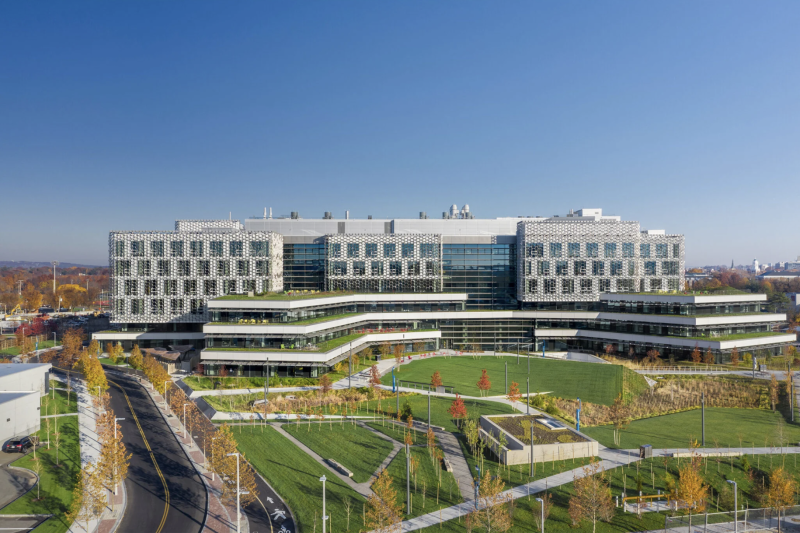Article
Initiative includes translational funding, mentorship, and programming to foster commercialization of innovations by engineers and applied scientists
More than 100 startup companies have been launched based on research conducted in Harvard labs during the past five years alone. Those new ventures have raised $4.4 billion in equity financing and created countless jobs.
But campus-based research has the potential for even greater impact. A new initiative is designed to help speed up the translation of innovations from University labs into startups that bring to market products and services addressing climate change, alternative energy, sustainability, and a range of other global challenges.
Housed in the Science and Engineering Complex (SEC) in Allston and focused on the physical sciences and engineering across the University, the Harvard Grid will enable entrepreneurially minded Harvard researchers and students to translate their research into startups.

A collaboration between the Harvard John A. Paulson School of Engineering and Applied Sciences (SEAS) and the Harvard Office of Technology Development (OTD), the Grid will provide researchers and their emerging ventures with internal accelerator funding, physical space, educational programming, and connections to alumni, investors, and the startup ecosystem. The goal is to advance promising technologies to the stage where they can be the basis of a startup and attract seed capital.
SEAS and OTD have named Paul Hayre, a serial founder and veteran executive of and adviser to early and growth-stage startups, to serve as the Grid’s inaugural executive director.
“Early stage academic research often requires translational development that is beyond the scope of traditional government research funding,” said Isaac Kohlberg, Harvard’s chief technology development officer and senior associate provost. “The Grid provides the infrastructure and environment for Harvard researchers to advance their innovations and create more impactful startups.”
Four activities are part of the Grid’s initial offerings:
- Translational awards to support Harvard faculty-led research projects at the cusp of commercial viability;
- Dedicated workspace for selected teams, adjacent to faculty labs and other core facilities;
- Onsite advisers to provide venture-building expertise and mentoring in startup formation, fundraising, IP strategy, licensing, business development and other requirements unique to science-based startups; and
- Educational programming geared toward undergraduate and graduate students, postdocs, and faculty, focused on translational and entrepreneurial skills, in collaboration with other University innovation initiatives.
“The Harvard Grid will be a focal point for translational activities in the sciences and engineering,” said Frank Doyle, the John A. Paulson Dean of SEAS. “It will help nurture a new generation of Harvard entrepreneurs and innovators and represents an important milestone in our mission to bring technology and talent to solve real-world problems.”
Doyle added that an animating priority of the new initiative is to increase the diversity of founders by expanding access to resources and mentorship for women and members of groups traditionally underrepresented in entrepreneurship and venture capital.
Accelerator funding provided through the Grid builds on a track record of success established by OTD. Since 2013, projects advanced by Harvard’s Physical Sciences and Engineering Accelerator have culminated in new startups, licenses to established companies, and research collaborations with industry.
Now part of the Grid, the Accelerator will have increased grant-making capacity. Selected teams will join an entrepreneurial cohort with dedicated physical space at the SEC.
OTD staff and industry experts will provide ongoing guidance to the entire research community, and the Grid will actively engage with the venture communities in Boston and beyond.
The Grid will advance its educational mission by integrating innovation and entrepreneurship into the curricular and co-curricular life of SEAS. Workshops, lectures by subject-matter experts, and other community programming will help students, postdocs, and faculty build entrepreneurship and translational skills, expose participants to leaders from relevant fields, and engage the broader community of startups, industry, investors, and alumni.
The Grid’s location in Allston will add to an emerging node on the region’s innovation ecosystem that includes Harvard Business School, the Harvard i-lab, the Pagliuca Harvard Life Lab, and the coming Enterprise Research Campus. With its state-of-the-art labs, makerspace, specialized science instrumentation, and hands-on teaching spaces, the SEC sits at the center of this burgeoning district.

